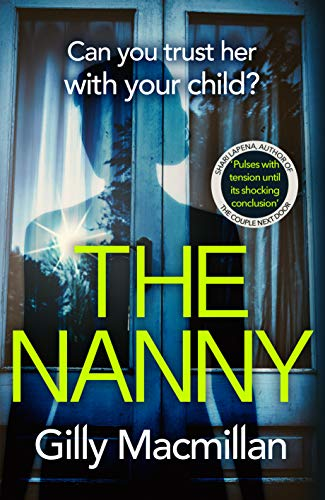Interview with Gilly MacMillan
Author of The Nanny
Gilly Macmillan is a bestseller across the globe. Her suspenseful crime novels have been translated into over 20 languages.
What She Knew was her first novel, appearing in 2015 and being nominated for a prestigious Edgar Award. The book also achieved the prestige of hitting the bestseller lists. Gilly followed with The Perfect Girl (2016), Odd Child Out (2017), I Know You Know (2018) and her latest thriller The Nanny, released in June 2019.
A former art historian and photographer, Gilly studied at Bristol University and the Courtauld Institute of Art in London. She lived for a spell in California and now lives in Bristol, UK, with her husband and three children.
She is currently working on her sixth novel.
Buy this book
Many of our readers are also writers. There are two topics which all writers love to discuss – process and money! We won’t ask about the latter, but could you share a little about your writing process?
- I start my novels with an idea that fascinates me, at least one strong character and a broad sense of what will happen at the end of the book. The next step is to come up with a cracker of an opening scene and get started. In theory I would love to have the book more planned out before I write, but I never seem to manage that, and I’m afraid the books would lose some of their intensity if I did. I definitely get my best ideas while I’m in the process of writing – I think it’s to do with tapping into a certain level of concentration – and I enjoy the freedom of letting those develop as I write. The downside is that this method can lead to some extensive editing at second draft stage, but I do believe it leaves me with a stronger end product. Having said that, I know many brilliant writers plan first, so it’s a very personal thing. This way just works best for me.
Point of view is one of the approaches which differs between writers – some adopt a distant, authorial voice, other prefer a more immersive experience. You’ve worked with multiple points of view to give different perspectives on a story, and you’re not afraid to write in the first person. Would you talk a little about your approach, and how it shapes your storytelling?
- Character is very important to me and I love to immerse myself in my characters. First person is a brilliant way to let the reader directly into your character’s head. I tend to choose whether to use first or third person by following my gut instinct, though my primary character – my heroine – will almost always be in first person. I first used multiple points of view in my second novel, THE PERFECT GIRL. The novel takes place over a very tight time line and is very claustrophobic. I hoped the multiple points of view would give an almost cinematic effect. I was thinking of crowd scenes in films where the camera travels around a room and focuses briefly on different characters so we can build a picture of what’s happening. It creates a terrific energy that I was trying to mimic.
Britain has provided many great settings for novels. You’ve made the West Country your literary home. How significant is location to your creative process?
- I always hope to create a strong atmosphere in my books, so location is very important. I chose to set my first novel in Bristol for two reasons. Firstly, it’s a terrific city, historic but also very alive nowadays, with amazing locations and architecture, and it’s buzzing with people from all walks of life. Secondly, it was a practical choice because I have lived in Bristol for the past ten years. I wanted to make the location a sort of character in itself – I think that’s something crime fiction does very well – so it was an easy decision to use a location that I already knew inside out and felt strongly about because it was literally on my doorstep.
You have a background in art and photography. I’m interested in the photographer’s eye for what to include, what to leave out – that whole business of framing a picture. Has this helped with your writing? Could you talk a little about where these two art forms meet – and perhaps where they diverge?
- It's helped enormously. When you compose a photograph, you are being selective about what you include because you want to create a certain atmosphere, or story, and writing is no different. You have to have an eye for detail but also have the bigger picture in mind. Everything you include counts and it’s also important to know what you can leave out that might make your story stronger. I’m not sure the art forms do diverge a great deal. We can be looking for story, beauty, something attention grabbing, or contemplative, and much more in both the visual and written arts and it’s up to the creator to curate our experience of that.
This might not be easy: without any plot spoilers, could you give our readers a quick summary of The Nanny?
- When her beloved nanny disappears overnight, seven-year-old Jocelyn never gets over the loss. How could she vanish without saying goodbye? Thirty years later, and now with a daughter of her own, Jo is forced to return to her old family home and confront her troubled relationship with her mother. But when human remains are found in the grounds of the house, and an unexpected visitor knocks at the door, Jo discovers that her childhood memories aren’t what they seem.
You’ve created a very dysfunctional family in the Holts. Was it fun?
- It was! And I think a lot of that was to do with the setting, and the family itself, both of which were a little bit of a departure for me. I love to start my books with a ‘normal’ idea of a family (though I don’t really believe there’s any such thing as ‘normal’) and then develop the characters and setting so that things get somewhat darker and more dysfunctional and the tension and fear creep in…
For any readers unfamiliar with your work, which authors do you feel closest to in style or approach? And who do you love to read?
- I’m often compared to Mary Kubica, a writer from the US, whose books I really admire. Her debut THE GOOD GIRL is a great place to start if you want to try her work. I read very widely, in all genres. Lately, I really enjoyed Madeline Miller’s books CIRCE and THE SONG OF ACHILLES. The most recent thriller I’ve loved was a literary one by Olga Tokarczek called DRIVE YOUR PLOW OVER THE BONES OF THE DEAD. Other favourite suspense authors include Sarah Vaughan, Shari Lapena, James Lee Burke and Graeme McRae Burnett.
How do you want the reader to feel in the middle of The Nanny, and after they’ve read it?
- Terrified in the middle and emotionally exhausted by the end.
Possibly getting ahead of ourselves here, but: who would you cast in the lead roles in the movie?
- I’d love Jessica Raine to play Jo and Fiona Shaw to play Virginia. Olivia Coleman would make a terrific Hannah.
You’re working on your sixth novel. Will this be crime / suspense too? When might we expect it to hit the book shops?
- My sixth novel is also a psychological suspense novel. It will hit the shelves in 2020.
Synopsis
Seven-year-old Jocelyn loves her nanny more than her own mother.
When her nanny disappears one night, Jo never gets over the loss.
How could she vanish without saying goodbye?
Thirty years on, Jo is forced to return to her family home and confront her troubled relationship with her mother. When human remains are discovered in the grounds of the house, Jo begins to question everything.
Then an unexpected visitor knocks at the door and Jo’s world is destroyed again as, one by one, she discovers her childhood memories aren’t what they seemed.
What secrets was her nanny hiding – and what was she running away from? And can Jo trust what her mother tells her?
Sometimes the truth hurts so much you’d rather hear the lie.

